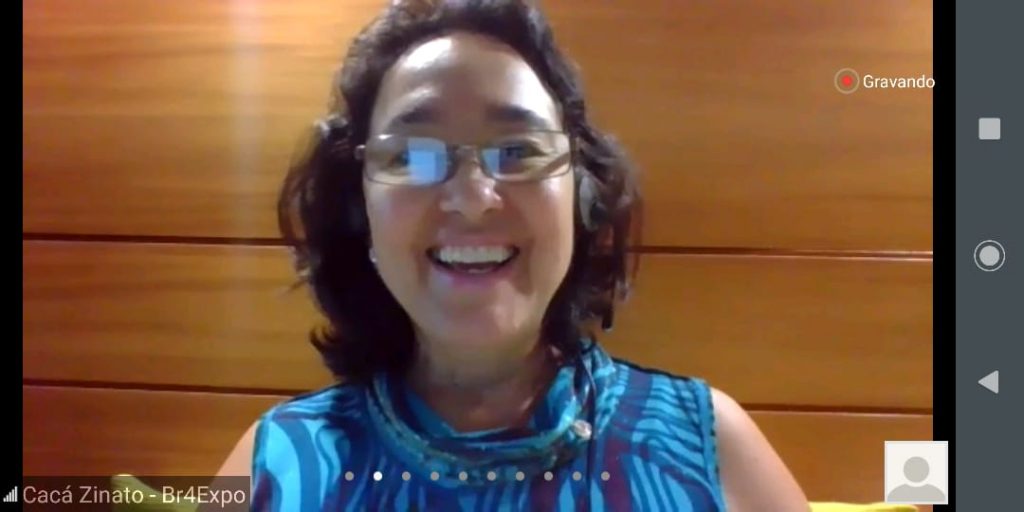São Paulo – The Instituto Jovem Exportador (Young Exporter Institute) will promote in 2021 the 3rd Internationalization Trail of the Young Exporter Program bound to the Middle East. A trade mission will be sent to the region from February 18 to 25, 2021, with 30 young businesspeople. The itinerary will end with a participation in a food and beverage trade show, Gulfood 2021, to run in Dubai, United Arab Emirates.
The initiative was presented during webinar hosted by the Instituto Jovem Exportador last Tuesday (16) afternoon, featuring Arab Brazilian Chamber of Commerce secretary-general Tamer Mansour. The event opened the 3rd Arab Market Matchmaking Series – Young Exporter Program, which will include other five meetings addressing cultural, social and economic aspects of the Middle East market.
The project’s manager Maria do Carmo Zinato (pictured above) explained that the Trail will host online discussions that will start in July and run through the second half of the year. “One of the main reasons for young businesspeople to register is the access to information. During months, they will receive contents on the overall foreign market and specifically the Arab market and how to better put their product out there with game challenges. They will also have access to government authorities and businesspeople that have experience the challenges of breaking into the Arab market, as well as other key organizations,” she explained.
Zinato says that the project offers the opportunity for young people to expand their connections. “Those who have access to the Arab Market will have a wider range of customers. Those that already export aren’t experiencing the hardships of those restricted to the domestic market. It’s quite good, especially for those who have innovative, sustainable, zero-waste products. You are taking to the Arab world a product that is considered exotic there, the Brazilian product,” the executive said.

The Middle Eastern market and exports were the topic of the webinar. Mansour, one of the lecturers, said that Brazilian marketing abroad, especially to Arabs, has plenty of room for improvement. The secretary-general pointed out that the Brazilian image needs some work to show everything that the country has done. “We have to separate things for Arabs into two particular screenings: halal, according to the Islamic rules; and guaranteeing a high-quality product, which requires that Brazil be transparent, prepared for a screening system, ready for innovation and digitization. Brazil is the best country in meeting requirements, but one of the worst in marketing products. This is done through product screening,” he pointed out.
Highlighting other labels such as organics and the certificate of origin for Amazonian products is one of the best ways to strengthen the Brazilian image, he says. “When someone reads ‘Amazonia,’ they understand that it’s natural, healthy. The cosmetic manufacturers must understand that,” he said.
Mansour believes that it is important to disseminate opportunities for Arabs in industries such as construction in Brazil. “The Arab private initiative is young and likes to take risks. We’re working inside the Arab Chamber to encourage Arab investments more and more,” he explained, saying that the pandemic has sped up the use of technologies among the Arabs, too. “We’ve seen over the last years that [in the UAE] they liked it but didn’t use it that much in everyday life. The digital transformation had took over the UAE market but only started occurring in fact because of the needs ushered by the COVID-19 crisis. Not only in the UAE but the entire Arab world,” he said.
The diversity among the 22 Arab countries is still another opportunity that can be explored. Mansour stressed that there are different profiles within the Gulf, for example. While the Emirate market operates as a regional hub, Saudis have a stronger domestic consumption, creating opportunities for value-added exports.
The event also featured Instituto Jovem Exportador president Ronan Pires, vice president Marcos Dias, and Matchmaking Brazil director Bernhard Smid.
Translated by Guilherme Miranda




